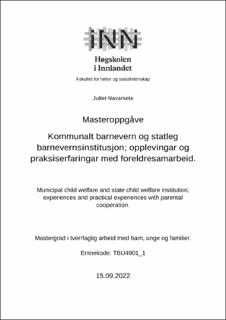Kommunalt barnevern og statleg barnevernsinstitusjon; opplevingar og praksiserfaringar med foreldresamarbeid.
Abstract
Samandrag
Hensikt:Studien har søkt å utforske tilsette i kommunalt barnevern og tilsette i statlege barnevernsinstitusjon sine opplevingar og erfaringar knytta til foreldresamarbeid til ungdom plassert på institusjon. Studien er spissa til plassering på frivillig hjelpetiltak under statleg omsorgsinstitusjon.
Problemstilling:Problemstillinga i denne masterstudien er; «Kva opplevingar og praksiserfaringar har tilsette i barnevernet og på barnevernsinstitusjon for samarbeid med foreldre til ungdom som bur på institusjon?»
Metode:Denne studien har eit kvalitativt forskningsdesign med fokusgruppeintervju som metode. Det er gjennomført delvis strukturerte fokusgruppeintervju med to blanda grupper, med fem informantar i kvar gruppe. Informantane er tilsette i kommunale barnevernstenester og tilsette ved institusjonar under statleg regi, barne- ungdoms- og familieetaten. Informantane kjem frå forskjellige kommunar i Vestland fylke. Som analysemetode er det nytta tematisk analyse.
Resultat:Gjennom analysen kom eg fram til følgjande kodegrupper; Tilsettes forståing av foreldresamarbeid, ulike erfaringar av foreldresamarbeid, oppleving av tverrfagleg samarbeid for foreldreinkludering og erfaring rundt overgang/tilbakeføring.
Konklusjon:Dei tilsette har fleire og ulike erfaringar av foreldresamarbeid. Funn syner blant anna faktorar dei tilsette meiner er viktige for eit godt samarbeid, og faktorar dei meiner kan vere utfordringar i eit samarbeid. Dei tilsette er opptatt av å legge til rette for eit foreldresamarbeid og at eit sånt samarbeid må starte tidleg. Dei belyser blant anna tillit, respekt, god kommunikasjon og ein bevisst holdning knytta til maktforhold i rolla si. Når det kjem til tverrfagleg samarbeid mellom dei to instansane viser funn at dei tilsette har eit fokus på korleis dei ønsker det skal vere, men at begge instansar har tankar om kva som ikkje fungerar så godt. Både når det kjem til tiltaksplaner som arbeidsverktøy og ansvarsgruppemøter som arena for samarbeid viser dei tilsette til ønsker om bedring. I overgangen når ungdommen skal flytte frå institusjon til eigen bustad, i anna tiltak eller heim til familien legg dei tilsette vekt på tidleg innsats og gode planar, samt ei inkludering av foreldra og ungdommen undervegs for å sikre at ulike at ønsker og behov blir ivaretatt. Slik dei tilsette skildrar dagens situasjon ber det preg av ønsker om eit betre samarbeid mellom instansane som kan påverke ungdommen og foreldra positivt. SummaryPurpose:The purpose of this study was to explore the experiences of employees in municipal child welfare and employees of state governed institutions when it comes to cooperating with parents of youth that are placed in institusions. Placements in state care institution on voluntary relief measures have been the focus in this study.
Issue: What practical experiences does employees in child welfare and in child welfare institutions have when it comes to cooperating with the parents of youth living in child welfare institution?
Method:This study has a qualitative research design with focus group interviews as method. Partly structured focus group interviews have been carried out in two mixed groups, with six informants in the respective groups. The informants are employees in municipal child welfare and employees of state governed institutions, child-, youth- and family agency. The informants’ background are from different municipalities within Vestland, the western county. Thematic analysis has been used as analytic method.
Result:Through the analysis, I found these group codes; The employees understanding of parent cooperation, different experiences of parent cooperation, experience of interdisciplinary cooperation to ensure that parents are included, and experience linked to transition/return to parents.
Conclusion: The employees have multiple and different experiences when it comes to cooperating with parents. Factors that the employees find valuable, and factors that they think might be challenging when it comes to cooperating with parents, are some of the things that were pointed out in the findings. Employees are interested in how they can ensure cooperation with the parents, and that the cooperation must start early. Trust, respect, good communication and a conscious attitude towards power relations in their role as a professional are among the things that they point out. When it comes to interdisciplinary cooperation between the two instances, findings shows that the employees are focusing on how their instance want it to be, although they have thoughts about what is challenging. The employees want improvement when it comes to action plans as a working tool, and responsibility group meetings. In the transition when youth is moving from institution to their own house, in another base or back to the family, the employees emphasise early intervention and good plans, as well as including the parents and the youth along the way to make sure that their wishes and needs are taken care of.
